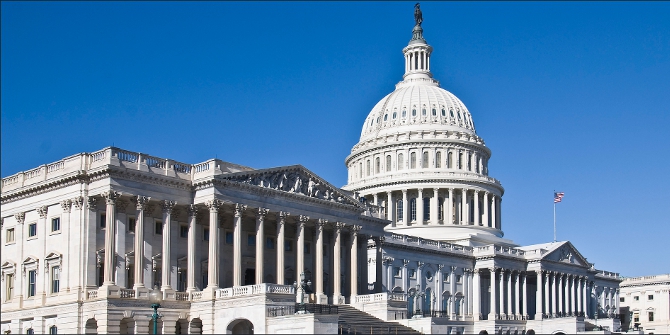USAPP Managing Editor, Chris Gilson looks at the best in political blogging from around the Beltway.
Jump to
[one_half last=”no”]
The 2016 campaign
This week’s primaries
The Democratic Campaign and the Candidates
The Republican Campaign and the Candidates
The Obama Administration
[/one_half][one_half last=”yes”]
The Beltway and the Supreme Court
Foreign policy, defense and trade
Obamacare and health policy
The economy and society
[/one_half]
The 2016 Campaign
The Federalist this week writes that Mormons could stop New York billionaire Donald Trump from becoming president, after last week former 2012 presidential candidate (and Mormon) Mitt Romney endorsed Texas Senator Ted Cruz and called Trump’s politics ‘repulsive’. They say that Mormons ‘do not care much for liars’, which is why Trump will lose the Utah caucuses this week, which will hurt his presidential chances. The Lonely Conservative also talks Utah, arguing that if Trump is the GOP’s nominee, Utah will go to the Democratic nominee, despite being a relatively red state. Writing Friday, FiveThirtyEight says that Trump will have a hard time turning blue states red in November. Speaking of states, The Fix profiles the five big states which are very likely to decide the nominations for both parties: California, New York, Indiana, Pennsylvania and New Jersey.
Donald Trump is doing much better in the GOP’s presidential primary than almost anyone has expected – but will his primary wins translate to success in the fall general election? Smart Politics says no. Examining the last eight presidential cycles, they find that the nominee who had a stronger winning percentage in November in states they lost during primaries than ones they had won. Townhall echoes this, commenting that having only won 37 percent of Republican votes in the primaries thus far, it’s hard to see how he might make it to 270 electoral votes in the general election. The Left Coaster, meanwhile wonders how much of the GOP will vote in the general election, given the likely nomination of Trump. They speculate that Republican turnout may fall as much as 7 percent if the New York billionaire is nominated.
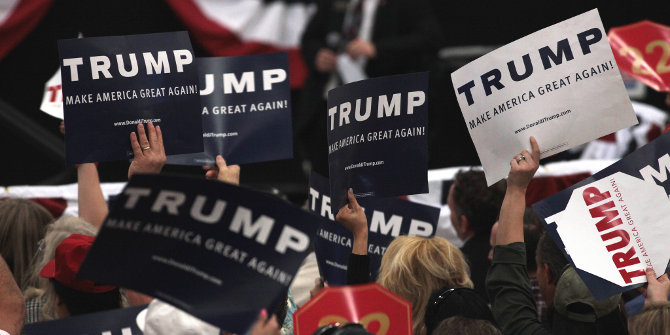
Red State addresses Trump supporters, telling them that they can’t have it both ways in the general election: believing that Trump will win the general election handily, while at the same time accusing Republicans who would not support him in the general of handing the election to Hillary Clinton. The Fix writes Friday that polls show that Trump is the worst general election candidate for the GOP, with both Hilary Clinton and Bernie Sanders beating him handily in the fall. Red State comments that where millennials are concerned, they actually prefer Ted Cruz to Trump or Clinton. Daily Kos says that a Trump candidacy would be great for Democrats, as it may put the House majority in play for the party, something that until know was virtually unthinkable. Monkey Cage, meanwhile looks at whether or not Trump will be able to win over Sanders’ supporters as they share similar views on free trade (both candidates oppose it). It turns out that Democrats who don’t like trade don’t like Trump, either. Trump is also unlikely to win votes from disaffected Democrats in the fall, says Monkey Cage.
Tuesday saw terrorist attacks in Brussels, Belgium. The Fix comments that the attacks raise foreign policy questions for the 2016 candidates – questions that are likely to go unanswered.
This week’s primaries
Primaries were held this week in Arizona, and Utah for both parties, with Idaho holding a Democratic caucus. Red State reports that Trump won in Arizona, while Hillary Clinton came out on top over Bernie Sanders, according to PoliticusUSA. Both Clinton and Trump faltered this week in Utah and Idaho with Ted Cruz winning the former (Post Politics), and Sanders the latter (Daily Kos). The Fix says that in winning Arizona, Trump was the biggest winner of this week’s primaries, with Utah’s online efforts being one of the losers given the limited voting time, and the glitches that occurred.
The Democratic Campaign and the Candidates
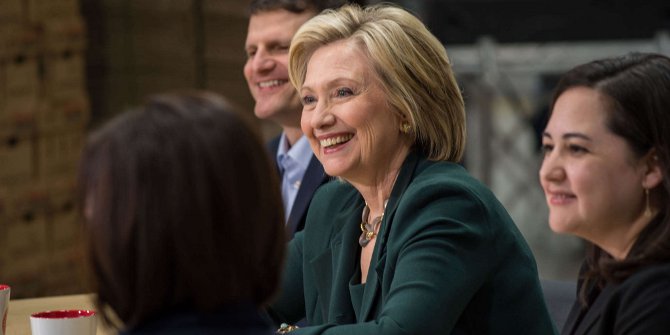
On Friday The Fix wonders whether or not the Democrats have a chance of winning back the US House of Representatives this year. They say that they have a shot at seven of the ten seats that are most likely to change hands in November, and that the GOP are defending 26 districts which voted for President Obama in 2012. With Trump or Cruz at the top of the ticket, many of these seats could be in play. What’s far more likely though, is a Democrat takeover of the Senate. Daily Kos says that while the party has an advantage, with some great challengers to GOP held seats, the Republicans are far outspending their Democratic counterparts, which could put a spanner in the works.
Moving on to what the two candidates have been up to this past week:
Hillary Clinton
Over the course of the Democratic primary campaign, many on the right have suggested that Hillary Clinton could be indicted as part of the investigation into her use of a private email server while Secretary of State. The American Prospect says that this isn’t likely – there’s no reason to think that Clinton has committed any crimes. Townhall, meanwhile argues that Clinton is bad for the stock market and for the economy, given that she wants to raise taxes, end oil drilling and ‘wage war against…Wall Street’.
This week saw the meeting of the American Israel Public Affairs Committee (AIPAC). Speaking to the group, Clinton established her position on Israel (one which rejects the idea of neutrality) as being to Donald Trump’s right, reports Americablog. The Fix, meanwhile, reckons that Trump is the best thing that’s happened to Clinton in the 2016 race, given how much he overshadows her.
Bernie Sanders
On Sunday, Post Politics reports that in February Sanders outraised and outspent Hillary Clinton, leaving him with $17 million cash on hand. They say that overall, Sanders has raised just under $140 million, compared to Clinton’s $161 million.
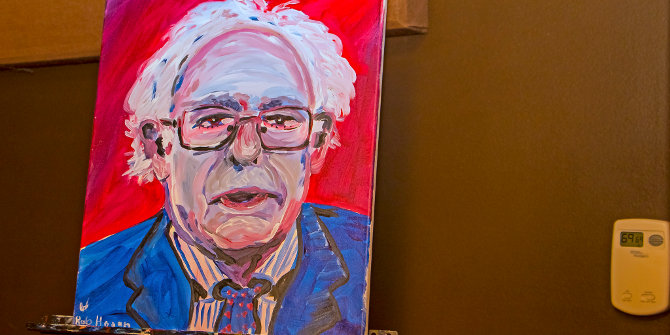
Does Sanders actually have a path to the Democratic nomination? No, says Red State – as of Wednesday, Sanders had 939 delegates (including those from wins in Idaho and Utah) and Clinton, 1,711. The Fix agrees with this assessment. Post Politics says that while Sanders is definitely ‘in it to win it’, he is also building grassroots enthusiasm for Democrats regardless of whether he wins the nomination or not. Post Politics echoes this, reporting Monday that a rally in Washington State (ahead of the state’s primary) drew more than 30,000 people over the weekend. FreakOutNation, meanwhile reports that while Senator Elizabeth Warren (D-MA) has not weighed in behind Clinton or Sanders, she is cheering Sanders on.
On Friday, Daily Kos says that the Sanders campaign has served the Democratic National Committee with a lawsuit over its decision in December to suspend its access to party voter files following a data breach.
The Republican Campaign and the Candidates
Will Donald Trump be able to clinch the nomination before the GOP convention in July? FiveThirtyEight doesn’t know for sure, but they reckon that it’s going to be close. If the Republican Party wants to keep trying to stop Donald Trump from gaining the nomination, it’s going to be a tough fight, says The Fix. Red State writes along similar lines, arguing that the primary is likely to run until at least June. FiveThirtyEight previews what a ‘two-front’ war geared at denying Trump the nomination might actually look like. With Ted Cruz and John Kasich potentially divvying up states to deny Trump the number of delegates he needs at the convention. Most Republicans are actually ‘mortified’ by the party’s 2016 presidential race, comments Daily Kos, reporting on a new poll.

On Saturday, American Thinker argues in favor of Ted Cruz gaining the nomination if possible, and only for Donald Trump if no-one else can. Speaking of Cruz, The Fix has three maps which show why Trump may have a better chance of being elected compared to the Texas Senator. They also say that the fact that given Mitt Romney and Jeb Bush’s endorsements, Ted Cruz is now the GOP’s establishment candidate, and that that’s ‘absolutely insane’. Townhall writes that both nominating and not nominating Trump will wreck the GOP as we know it, with many anti-Trump Republicans likely to desert the July convention – and the party – if he isn’t denied the nomination, and many of his supporters likely to do the same if he is. No more mister nice blog reckons that even if Trump is nominated, he will lose – and this won’t cause a GOP ‘crack-up’.
On Wednesday, Crooks & Liars reports that things are getting ‘nasty’ in the GOP race, with Donald Trump attacking Ted Cruz’s wife, Heidi. The Atlantic looks at what they call the ‘weaponization’ of Heidi Cruz and Melania Trump (Donald Trump’s wife), commenting that the proxy fight using them shows how much US conservatism has changed. By Friday, the Cruz/Trump fight had moved on to sparring over ‘salacious rumors’ around Senator Ted Cruz’s alleged affairs, says Political Animal. For The Fix, the allegations against Cruz make total sense in the current ‘absurd’ campaign.
Wonkblog traces the origins of Donald Trump’s candidacy back to 2000, with the House’s vote to extend permanent normal trade relations to China. They say that this legislation led to a series of ‘economic and political earthquakes’ which led to Trump’s rise as an anti-trade candidate. The Atlantic writes Wednesday on what Trump and Ted Cruz should learn from this week’s terrorist attacks in Belgium, that by demonizing Muslims, they risk making America more like Europe, which is precisely what they are both against.
On Sunday, Post Politics reports that in the final weeks before he pulled out of the presidential nomination race, former Florida Governor, Jeb Bush pumped $400,000 into his campaign in order to keep it afloat.
Extending beyond the presidential election, Outside the Beltway wonders if nominating Trump would put the House at risk for the GOP. They say that despite the relative lack of competitive House seats for the Democrats, with Trump or Cruz at the top of the ticket, it could be more vulnerable than Republicans would care to admit.
Moving on to the GOP’s slate of candidates for the presidential nomination:
Donald Trump
- Three ways to think about Donald Trump (Powerline)
- Leftists don’t hate Trump – they’re afraid of him (American Thinker).
- Retired neurosurgeon (and former GOP presidential candidate) Ben Carson is apparently lobbying Trump to be his vice president (RedState)
- Trump’s ’Mormon problem’ is about more than just Mormonism (The Fix)
- The anti-Trump endorsement game (The Atlantic)
- A new study says that Trump uses the language of a 5th grader (RedState)…
- …while another shows that he lies 77 percent of the time (America blog)
- Ten things Trump said, but he says he didn’t (The Federalist)
- How do we know Trump’s exaggerating? He uses the word ‘everybody’ (The Fix)
- Why Trump won’t be another Hitler (American Thinker)
- Trump this week finally lost the TV ratings battle – to President Obama (The Fix)
-
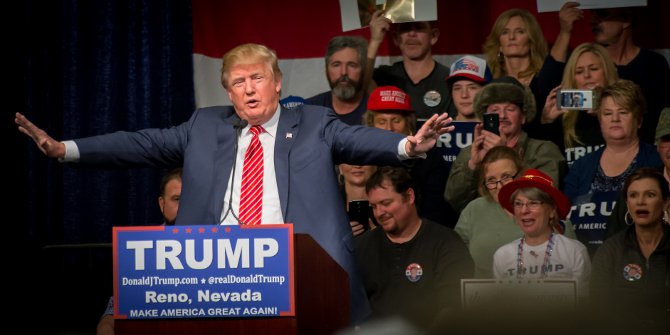
Donald Trump Credit: Darron Birgenheier (Flickr, CC-BY-SA-2.0) Trump is over NATO (The Fix)
- Did Trump really suggest he might nuke ISIS this week? (RedState)
- Do Trump’s foreign policy advisers really matter? (The Federalist)
- Trump’s tariff plan could lead to trade wars with China and Mexico (PoliticusUSA)
- Why white voters won’t be enough to put Trump in the White House (The Fix)
- Trump’s ‘self-funded’ campaign is actually not – though it is thrifty (The Fix)
- This week Trump stopped in the middle of a press conference to interview someone for a job (Crooks & Liars)
- Just why does Trump get away with saying whatever he wants? (The Fix)
- Economic and racial anxiety are driving support for Trump (Wonkblog)
- A new interview shows that Trump is a small man (The Atlantic)
- How Trump is sexism’s ‘enabler in chief’ (Americablog)
- Guess who’s less popular than both Congress and the GOP? Yep, it’s Donald Trump (The Fix)
- Trump is definitely unpopular with women – half od GOP women won’t vote for him (The Lonely Conservative)
- Trump’s unfavourables are troubling (RedState)
- Is Trump ‘reshuffling the deck’ to become harder to beat in the fall? Not really (TPM)
Ted Cruz
- Cruz this week won more delegates in Louisiana than Donald Trump (RedState)
- The Brussels attacks gave the Texas Senator another chance to slam President Obama for not using the term ‘radical Islamic terrorism’ (Hit & Run)
- Following the attacks Cruz proposed more intense police surveillance of US Muslim communities (No more mister nice blog)
- Cruz may be the first Republican to win a majority in a major primary contest (The Fix)
- Why did Jeb Bush endorse Ted Cruz? (The Atlantic)
- Cruz this week called Trump a ‘sniveling coward’ in for Trump’s unflattering tweets about Cruz’s wife, Heidi (RedState)
John Kasich
- It turns out that the Ohio Governor neglected to file a full slate of delegates for the Maryland primary (RedState)
- Kasich’s campaign is utterly strange and bizarre (Roll Call’s Rothenblog)
- Ted Cruz has been pressuring Kasich to drop out (Daily Kos)
- Is a vote for Kasich a vote for Trump? (Townhall)
- Will Kasich make it harder to defeat Trump? (The Atlantic)
The Obama Administration
This week, President Obama visited Cuba – the first president to do so in nearly a century. He was criticized by some for not coming home in the wake of the terrorist attacks in Brussels on Tuesday, and more specifically for attending a baseball game in Havana in the afternoon after them. Post Politics says that Obama commented that he decided to watch the game because terrorism’s premise is to disrupt people’s lives.
Even when the Senate is in recess, it’s able to foil Obama’s plans. The Atlantic says that despite being on break for two weeks, the Senate has been holding pro forma sessions, which prevent the president from making a recess appointment to the Supreme Court.
The Beltway and the Supreme Court
On Monday, Rule 22 comments that the federal budget for the fiscal year 2017 is essentially dead, with the House Budget Committee clearing a budget which also requires the Senate to approve $30 billion in savings before they vote on a budget. They write that the remaining question is whether House leaders can find a way forward on an omnibus bill or a continuing resolution – otherwise they face a shutdown during a presidential election year.

Americablog writes that a majority of Republicans now want the Senate to move ahead with Merrick Garland’s Supreme Court nomination, and that most Americans now feel that the GOP’s obstruction of Garland’s nomination is more about politics than giving them a voice. Outside the Beltway reports that Senator Mark Kirk (R-IL) has been the first to move from the GOP’s ‘no hearings’ position, having this week called for an up or down vote on Garland. Kirk faces a tough re-election fight in November.
Moving on to the Supreme Court in the news, Wonkblog writes that the Court’s decision to dismiss a lawsuit from Oklahoma and Nebraska challenging Colorado’s marijuana legalization framework sends a signal to other states who are considering similar drug policy reforms. The Federalist, meanwhile says that the Supreme Court has thrown out a Massachusetts court ruling which found that stun guns were not eligible for Second Amendment protections, and ordered the lower court to hear the case. With only eight sitting judges at the moment, there has been speculation about whether or not the Supreme Court will put off cases until after the presidential election. Monkey Cage says that it may well not put off any.
Foreign policy, defense and trade
On Monday, Monkey Cage looks at the reasons why Russian President Vladimir Putin may have changed his country’s policy on Syria, and conclude that ‘showing up’ President Obama is not likely to be one of them. American Thinker meanwhile, states that two countries are suffering from the US’ loss of nuclear deterrence, Ukraine and South Korea. On Thursday, The Atlantic looks at whether European countries are ‘free riders’, who enjoy the benefits of the international order safeguarded by the US military whilst contributing little to its upkeep. They say that not all military activities are US-led affairs, such as France’s 2013 intervention in Mali. On Friday, The Daily Signal says that America’s military is in much worse shape than most people would think, with two decades of conflict and budget constraints having taken their toll on the military.
As mentioned above, President Obama visited Cuba this week. Daily Kos writes that a majority of Americans support Obama’s move to restore diplomatic ties with Cuba. The Federalist looks at what is good, bad and ugly about Obama’s trip to Cuba, and argues that the trip legitimized Castro’s illegitimate rule over Cuba.
Obamacare and health policy
On Wednesday, The Fix comments that it has now been six years since President Obama signed the Affordable Care Act into law. They say that having given 17 million people health care, it is the central pillar of his legacy. The Daily Signal says that Obamacare was supposed to lower health care costs, but that those savings have not materialized; per capita health insurance spending is due to rise from nearly $7,800 per year to nearly $11,700 in 2024. Townhall meanwhile reckons that there has got to be a better way to pay for healthcare than the current system, suggesting a savings account approach where people put money away and then draw on it for their first few thousand dollars of coverage.
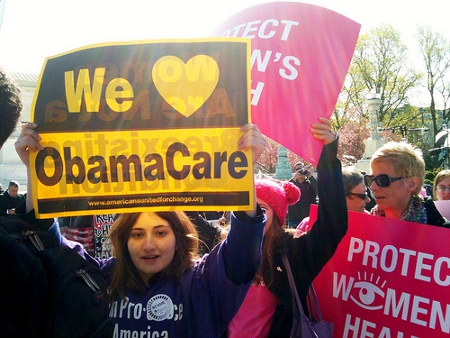
Ten Miles Square this week asks whether or not Obamacare should provide health coverage to undocumented immigrants after comments from Chelsea Clinton that it should be extended to that group.
On Sunday, Hit & Run says that more and more Americans are abandoning their health insurance in favor of joining Christian mutual aid societies, or ‘sharing ministries’, which are often cheaper for their members compared with Obamacare.
On Thursday, Wonkblog reports that older Americans are taking their vitamins – something which could be dangerous given the potential for life-threatening drug interactions.
The economy and society
For most people, work is a necessary evil. So how can the US make life less draining for workers? The Atlantic says that making benefits ‘portable’ – and not tying them to traditional additional would allow people more flexibility, and make it easier for them to work for themselves. Wonkblog, meanwhile, comments that laws which were meant to stop people discriminating against hiring employees because of their financial records have actually made hiring more racially biased. Also discussing work, Hit & Run has five quick facts about the gender pay gap, including that it shrank the most in the 1980s.
Free trade has been very much on the agenda in this year’s presidential election primary races, with both sides arguing against recent free trade deals. The Atlantic says that city mayors remain overwhelmingly committed to free trade, which they see as a chance to grow jobs in their municipalities.
Featured image credit: IIP Photo Archive (Flickr, CC-BY-NC-2.0)
Please read our comments policy before commenting.
Note: This article gives the views of the author, and not the position of USAPP– American Politics and Policy, nor of the London School of Economics.
Shortened URL for this post: http://bit.ly/1UWEF7j





